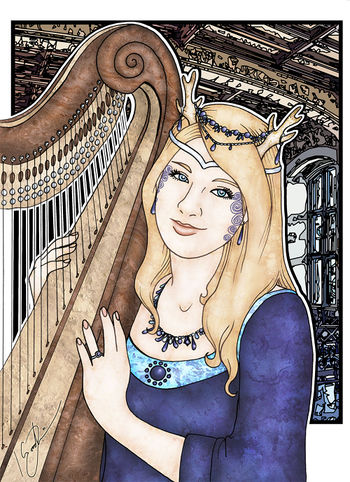Dawn music
The Music of Dawn
Style summary
Arthurian high medieval, chivalric, courtly, 'high' culture, battle anthems, tales of love, glory, and tragedy.
Dawn draws on the more formal folk and classical traditions of Shakespearean/Elizabethan period, for example madrigals, as well as fantastical folk tales from the English or Irish tradition.
Commonly known songs
- Sweet Kate - medium difficulty madrigal for 3 female voices
- Dawnish War Song - medieval song with drums and other instruments
- Britta's Glory - Verse-chorus war song
A musical tradition
All sensible knights understand that for their glory to continue after death, you rely on the skill and conviction of minstrels and storytellers. What better way to earn glory and reputation than to let them see your deeds for themselves? Therefore it is not uncommon for questing knights to invite along the best minstrel they can find to accompany them on a quest - it goes without saying that the safety of the minstrel is paramount. The best singers and storytellers have a song or tale ready for the victory feast the same evening, and direct retellings of glorious battles and the valour of Dawnish knights in either victory or death are always enthusiastically received!
One for the kids
Funeral Songs
Wedding Music
Songs about notable people/entities in Dawn
- The Ballad of Sir Alain, written for a knight killed in glorious battle
- Sir Isobel, a traditional Dawnish song which has had a recent rise in popularity
- The Novarion Phoenix, written about a Dawnish house
- Sir Colwyn, a recently-written song about a Dawnish knight.
- Onward to Glory I Go, an adaptable song of glory, popular amongst questing knights.
Further examples
Songs
- Come my pretty one - Dawnish song about life
- Sweet Kate - medium difficulty madrigal for 3 female voices
- April is in my mistress' face - difficult madrigal set for SATB
- Annan Water - gloomy ballad about drowning, medium
- Though Philomena Lost Her Love - medium difficulty madrigal, 3 female voices.
- My Bonny Lass She Smileth - SATB madrigal
- Weep O Mine Eyes - SATB madrigal, hardish
- Tanner's Hill - fantastical ballad, easy
- The Moon's Only Daughter - wistful ballad, easy
- His Banner's Not Mine - Love song, easy
- Weaver's Curse - cautionary tale, easy
- Spinning Song - tragic love song, easy
- The Rose Garden - Tragic love song, easy
- Sweet, Stay Awhile - Elizabethan love song, medium
Instrumentation and tunes
- Anything vaguely courtly using recorders, plucked strings, single drums, harps, autoharp, or similar.
- Elizabethan recorder music - very appropriate for Dawn, especially if played on recorders or harp with a single drum.
Other performance traditions
- Courtly dances.
How to adapt your repertoire
- Sing in a formal rather than bawdy style. Up the properness and pathos of your words. Strum your guitar like a lute. Roll your rrrrs!
Our sources
Thomas Morley, Kate Rusby, Bill Jones, Glasgow Madrigirls, the other Madrigirls who actually sing more madrigals,
Here is a youtube playlist to get you in the mood!
